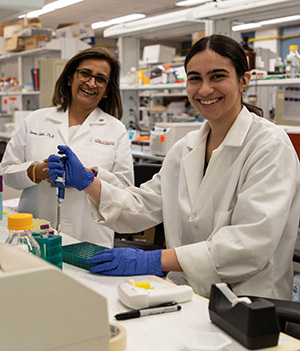Student News
SURFers Carve Research Waves
UHCOP Hosts 4 UH Undergraduates Mentees in Summer Undergraduate Research Fellowship Program
Oct. 3 — Four University of Houston undergraduate students recently gained or enhanced their research skill sets following the completion of their Summer Undergraduate Research Fellowship (SURF) in the laboratories of UH College of Pharmacy faculty research mentors.
Since the multidisciplinary UH SURF program was launched more than a decade ago, dozens of UH undergraduates have been paired with UHCOP faculty members for the full-time, 10-week program that is designed to encourage students to pursue advanced education and careers. SURF participants who complete the program receive a $4,000 stipend. Run by the Office of Undergraduate Research and Major Awards within the UH Honors College, the SURF program is supported by the UH Division of Research and the Office of the Provost.

The 2022 undergraduate SURF participants and their UHCOP mentors were:
- Honors Biomedical Sciences major Jenna Zamil under Associate Professor Samina Salim, Ph.D.;
- Biochemistry major Tasneem Islam under Professor Bradley McConnell, Ph.D., FAHA, FCVS;
- Biochemistry major Ayush Mehta under Assistant Professor Alexander Statsyuk, Ph.D.; and
- Finance major Pranjal Sheth under John J. & Paula Lovoi Endowed Professor of Drug Discovery and Development Diana S-L. Chow, Ph.D., FNAI.
During her fellowship, Zamil worked with Houston-based Afghan refugee women and examined their breast cancer awareness and knowledge as well as collected psychometric and biochemical data on biomarkers of stress and inflammation. More than 60,000 Afghans have been resettled in the U.S., with about 1,000 refugee families currently living in the Houston area and as twice as many more are expected within the year.
"Trauma, war, depleted social resources, and the practical challenges of displacement from their homeland make preventive health practices negligible, with women being the most vulnerable," Salim said. "Furthermore, Afghan women have the lowest breast cancer screening rates than ethnocultural groups living in Western countries. Such screening inequalities demonstrate the need for improved breast cancer education and screening efforts."
Yet, Salim noted that there is a scarcity of data about breast cancer risk among Afghan refugee women in Texas. Salim recruited Zamil to help investigate refugee stress profiles to gain more information regarding the connection between stress, their health risks and, more specifically, breast cancer risk.
"Dr. Salim was an incredible mentor throughout this process and I want to extend my thanks to her and the entire research team," Zamil said. "This experience reinforced my desire to work in health care, and I am eager to work hard for a future in which I can engage in furthering health causes through patient care and research."